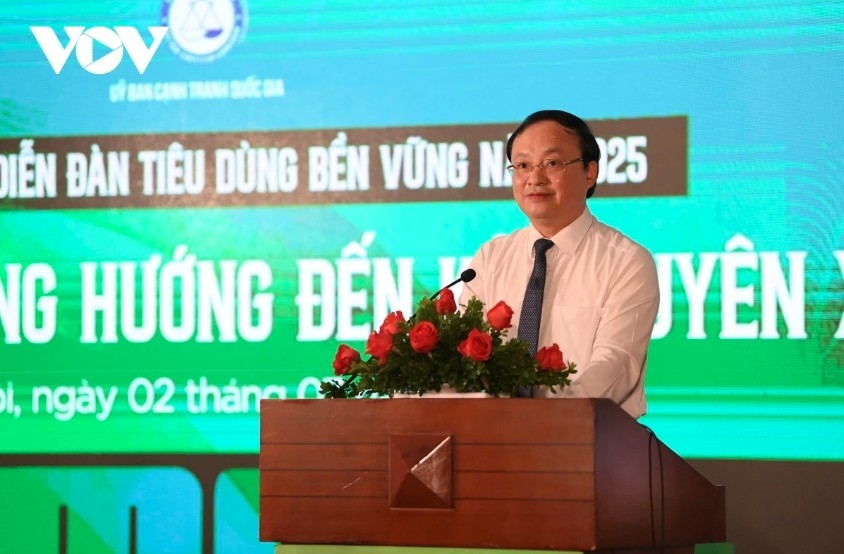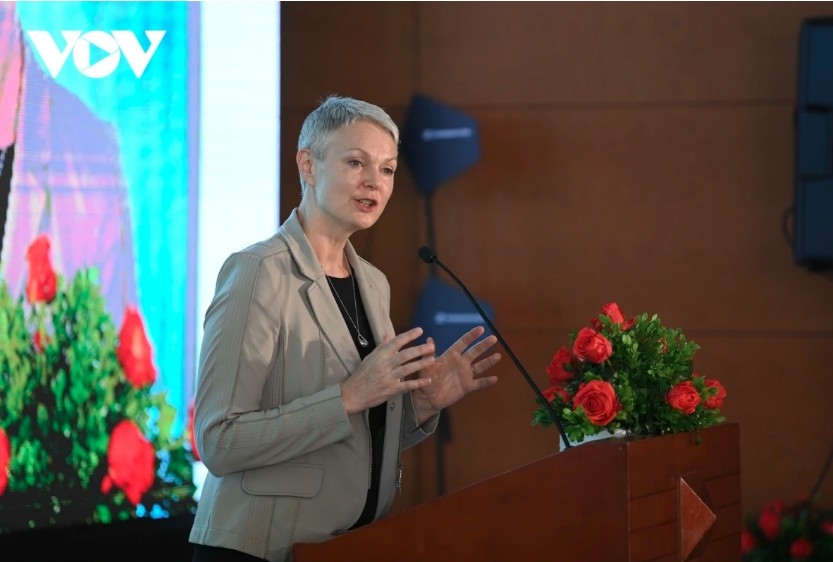Technology remains key in green journey from production to consumption
VOV.VN - Green production and green consumption are becoming an inevitable trend in the pursuit of sustainable development. However, even as demand for environmentally friendly and resource-efficient products continues to grow, the journey from production to consumption still faces technological challenges at its core.

Strong commitment to greening efforts
In his speech at the Sustainable Consumption Forum 2025 in Hanoi on July 2, themed “Sustainable consumption towards the Green Era”, Do Tien Sy, member of the Party Central Committee and President of the Voice of Vietnam (VOV), said the world is entering a new phase where economic value is closely tied to environmental and social value. In this context, sustainable consumption is no longer just an ethical choice, it has become a strategic pillar for national development.
He noted that every act of consumption, no matter how small, leaves a trace, whether in the form of greenhouse gas emissions, plastic or food waste, or resource depletion. However, when done responsibly, consumption can leave a positive trace: longer-lasting products, less waste, greater fairness, and a stronger sense of social responsibility.
Vietnam’s commitment to sustainable development and green transition has been demonstrated through key national strategies and policies, notably the Politburo’s Resolution No. 57 on science, technology, innovation, and digital transformation.
To translate these strategies into action, the top VOV leader underlined the need to make sustainable consumption more accessible, practical, and beneficial for the public, transforming green consumption from an ideal into a widespread lifestyle.
In the face of intensifying climate change and resource depletion, greening production and consumption is no longer optional, but essential. From tree-planting campaigns and renewable energy initiatives to efforts to reduce plastic waste, many businesses are clearly moving toward more sustainable models.
Vietnam has also taken an active role in international environmental cooperation, particularly in advancing a low-carbon economy while maintaining robust economic growth.
Green technology gives businesses competitive edge

Green production is posing plenty of challenges on businesses, especially due to high upfront investment, strict production standards, and material requirements. As a result, many companies remain cautious, only testing green products on a small scale, despite their clear relevance for export markets.
The key lies in applying advanced green technologies at a reasonable cost to produce environmentally friendly goods. According to Trinh Anh Tuan, chairman of the National Competition Commission, modern technologies act as a "magic wand" helping firms optimise resource use, reduce environmental impact, increase transparency, and ensure traceability. They also help lower operating costs and enhance productivity and competitiveness. Transparent product information and quality assurance are further advantages that support better consumer outreach.
Tuan stressed that promoting the production of sustainable goods, together with improving the legal framework and enforcement to protect consumer rights, is essential to ensuring a fair, transparent, and sustainable market.

In her remarks, Norwegian Ambassador to Vietnam Hilde Solbakken highly appreciated Vietnam’s efforts to promote sustainable production and consumption, highlighting the similarities between Vietnam and Norway as two open economies that rely on trade and maintain a deep connection with the ocean.
She highlighted that like Vietnam, Norway is a major seafood exporter and places sustainability at the heart of aquaculture policy. Through government regulations that encourage innovation, the Scandinavian nation has adopted technologies such as offshore and automated closed cages, along with AI monitoring systems, to reduce waste, prevent disease, and protect marine ecosystems. She added that the development of fish vaccines has helped virtually eliminate the use of antibiotics in the sector.
The ambassador emphasized that sustainable production and consumption is more than a policy, it represents a system-wide transformation. It demands vision, political determination, and international cooperation, with green technology playing a central role in delivering environmental solutions.



